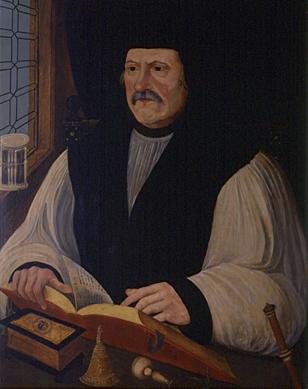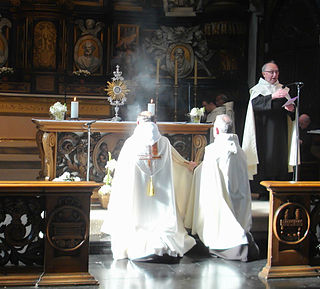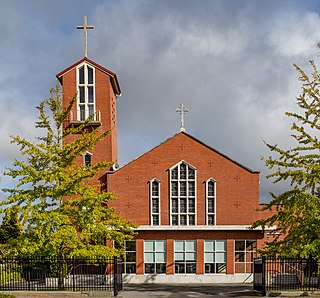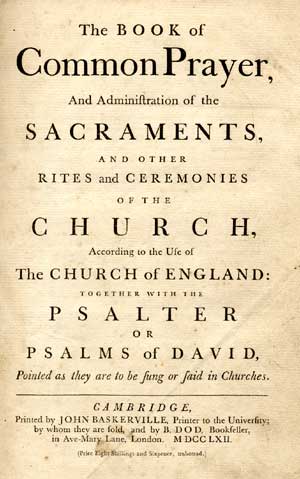

Regimen Animarum is a Latin codex that was written in 1343 for the Archbishop of Canterbury. It contains the Office of the Feast of Corpus Christi.


Regimen Animarum is a Latin codex that was written in 1343 for the Archbishop of Canterbury. It contains the Office of the Feast of Corpus Christi.
Regimen Animarum is a Latin book that was written in 1343 [1] : 13 by a Frenchman called "Beche." [1] : 18 It was written for the Archbishop of Canterbury. [1] : 13 It contains the Office of the Feast of Corpus Christi and talks about its history. It also contains teachings and sacraments used in the Catholic Church. It was intended to be a summary of the Catholic beliefs and an English clerical manual. [1]
The Regimen Animarum is not original content, but is the work of various Latin manuals combined. "Beche," therefore, is most likely the compiler of the books and not the scribe that wrote them. Of the three books that are found in the Regimen Animarum, his name appears in two of them. [1] : 18
The Regimen Animarum includes many of the offences and abuses that occurred in the church at this time. The book makes mention of rising resistance to the Pope. The book, therefore, anticipated the Protestant Reformation that would come later. [1] : 18
The book remained with private owners until recently. [1] : 15 The Regimen Animarum is currently in the L. Tom Perry Special Collections at Brigham Young University. [1] : 14
The original book has 211 leaves and has pages made of parchment. [2] It has nineteen gatherings of pages. [1] : 16 Before the text of Regimen Animarum begins, there are four leaves which contain the New Office of the Corpus Christi. [2] Each page is written with two columns and between 48 and 50 lines each. It also contains various pages of sheet music. [2] All headings in the book are red, and initials are in blue. The codex binding is made of goatskin. [1] : 14
The book is a compilation of three books. The first section of the book talks about the state of the soul. It discusses dangers to the soul as well as the importance of reverence and spiritual rituals. [1] : 17 The second part of the book is about teaching and exhortations of the Catholic Church. [2] The third part talks about the sacraments. [2]

The archbishop of Canterbury is the senior bishop and a principal leader of the Church of England, the ceremonial head of the worldwide Anglican Communion and the bishop of the Diocese of Canterbury. The current archbishop is Justin Welby, who was enthroned at Canterbury Cathedral on 21 March 2013. Welby is the 105th person to hold the position, as part of a line of succession going back to the "Apostle to the English" Augustine of Canterbury, who was sent to the island by the church in Rome in 597. Welby succeeded Rowan Williams.

Matthew Parker was an English bishop. He was the Archbishop of Canterbury in the Church of England from 1559 to his death. He was also an influential theologian and arguably the co-founder of a distinctive tradition of Anglican theological thought.

The Most Sacred Heart of Jesus is one of the most widely practised and well-known Catholic devotions, wherein the heart of Jesus Christ is viewed as a symbol of "God's boundless and passionate love for mankind". This devotion to Christ is predominantly used in the Catholic Church, followed by high church Anglicans, and some Western Rite Orthodox. In the Latin Church, the liturgical Solemnity of the Most Sacred Heart of Jesus is celebrated the third Friday after Pentecost. The 12 promises of the Most Sacred Heart of Jesus are also popular.

Corpus Christi College is a constituent college of the University of Cambridge. From the late 14th century to the early 19th century it was also commonly known as St Benet's College.

The Feast of Corpus Christi, also known as the Solemnity of the Most Holy Body and Blood of Christ, is a Christian liturgical solemnity celebrating the Real Presence of the Body and Blood, Soul and Divinity of Jesus in the elements of the Eucharist; it is observed by the Latin Church, in addition to certain Western Orthodox, Lutheran, and Anglican churches. Two months earlier, the institution of the Eucharist at the Last Supper is observed on Maundy Thursday in a sombre atmosphere leading to Good Friday. The liturgy on that day also commemorates Christ's washing of the disciples' feet, the institution of the priesthood, and the agony in the Garden of Gethsemane.

Trinity Sunday is the first Sunday after Pentecost in the Western Christian liturgical calendar, and the Sunday of Pentecost in Eastern Christianity. Trinity Sunday celebrates the Christian doctrine of the Trinity, the three Persons of God: the Father, the Son, and the Holy Spirit.

Eucharistic adoration is a Eucharistic devotional practice primarily in Western Catholicism, but also to a lesser extent in certain Lutheran and Anglican traditions, in which the Blessed Sacrament is adored by the faithful. This practice may occur either when the Eucharist is exposed, or when it is not publicly viewable because it is reserved in a place such as a church tabernacle.
Anglican Papalism, also referred to as Anglo-Papalism, is a subset of Anglo-Catholicism with adherents manifesting a particularly high degree of influence from, and even identification with, the Roman Catholic Church. This position has historically been referred to as Anglican Papalism; the term Anglo-Papalism is an American neologism and it seems not to have appeared in print prior to the 1990s. Anglican Papalists have suggested "that the only way to convert England is by means of an 'English Uniate' rite". Anglican Papalists have historically practiced praying the Dominican rosary, among other Marian devotions, Corpus Christi procession, as well as the reservation of and Benediction of the Blessed Sacrament.

Benediction of the Blessed Sacrament, also called Benediction with the Blessed Sacrament or the Rite of Eucharistic Exposition and Benediction, is a devotional ceremony, celebrated especially in the Roman Catholic Church, but also in some other Christian traditions such as Anglo-Catholicism, whereby a bishop, a priest, or a deacon blesses the congregation with the Eucharist at the end of a period of adoration.

Juliana of Liège, was a medieval Norbertine canoness regular and mystic in what is now Belgium. Traditional scholarly sources have long recognized her as the promoter of the Feast of Corpus Christi, first celebrated in Liège in 1246, and later adopted for the Catholic Church in 1264. More recent scholarship includes manuscript analysis of the initial version of the Office, as found in The Hague, National Library of the Netherlands and a close reading of her Latin vita, a critical edition of which was published in French by the Belgian scholar and current (2023) bishop of Liège, Jean-Pierre Delville.

The Parker Library is a library within Corpus Christi College, Cambridge which contains rare books and manuscripts. It is known throughout the world due to its invaluable collection of over 600 manuscripts, particularly medieval texts, the majority of which were bequeathed to the college by Archbishop of Canterbury Matthew Parker, a former Master of Corpus Christi College.
The Durham Rite is a historical liturgical use of the Roman Rite and the Gallican Rite in the English bishopric of Durham.
The Church of the Ascension is an Anglo-Catholic parish in the Episcopal Diocese of Chicago. Founded in 1857 as a mission of St. James Church, it is now located on North La Salle Drive on Chicago's Near North Side. The church became a part of the Anglo-Catholic movement in 1869. The principal service on Sunday is the Solemn High Mass celebrated at 11 a.m., according to Rite II in the Episcopal Church's Book of Common Prayer (1979). This Mass is celebrated at the High Altar, and includes three sacred ministers, many acolytes, incense, and music provided by a professional choir. The mass includes processions and other devotions on certain feasts and holy days.

A liturgical book, or service book, is a book published by the authority of a church body that contains the text and directions for the liturgy of its official religious services.

The liturgical books of the Roman Rite are the official books containing the words to be recited and the actions to be performed in the celebration of Catholic liturgy as done in Rome. The Roman Rite of the Latin or Western Church of the Catholic Church is the most widely celebrated of the scores of Catholic liturgical rites. The titles of some of these books contain the adjective "Roman", e.g. the "Roman Missal", to distinguish them from the liturgical books for the other rites of the Church.

The 1983 Code of Canon Law, also called the Johanno-Pauline Code, is the "fundamental body of ecclesiastical laws for the Latin Church". It is the second and current comprehensive codification of canonical legislation for the Latin Church of the Catholic Church. The 1983 Code of Canon Law was promulgated on 25 January 1983 by John Paul II and took legal effect on the First Sunday of Advent 1983. It replaced the 1917 Code of Canon Law which had been promulgated by Benedict XV on 27 May 1917.

Transiturus de hoc mundo is the papal bull issued on 11 August 1264 by Pope Urban IV in which the feast of Corpus Christi was declared throughout the entire Latin Church. This was the first papally sanctioned universal feast in the history of the Latin Church.

The St Mary's Pro-Cathedral, or St Mary's Church, is a Catholic church located on Manchester Street in Christchurch, in the South Island of New Zealand.

Corpus Christi Roman Catholic Church, Maiden Lane, is a Roman Catholic church in Maiden Lane, Covent Garden, in the Westminster City Council area of London, England. The church building, in Early English Gothic style, is grade II listed and was designed by F. H. Pownall; it was “specifically devoted to the adoration of the Blessed Sacrament.”

The 1662 Book of Common Prayer is an authorised liturgical book of the Church of England and other Anglican bodies around the world. In continuous print and regular use for over 360 years, the 1662 prayer book is the basis for numerous other editions of the Book of Common Prayer and other liturgical texts. Noted for both its devotional and literary quality, the 1662 prayer book has influenced the English language, with its use alongside the King James Version of the Bible contributing to an increase in literacy from the 16th to the 20th century.